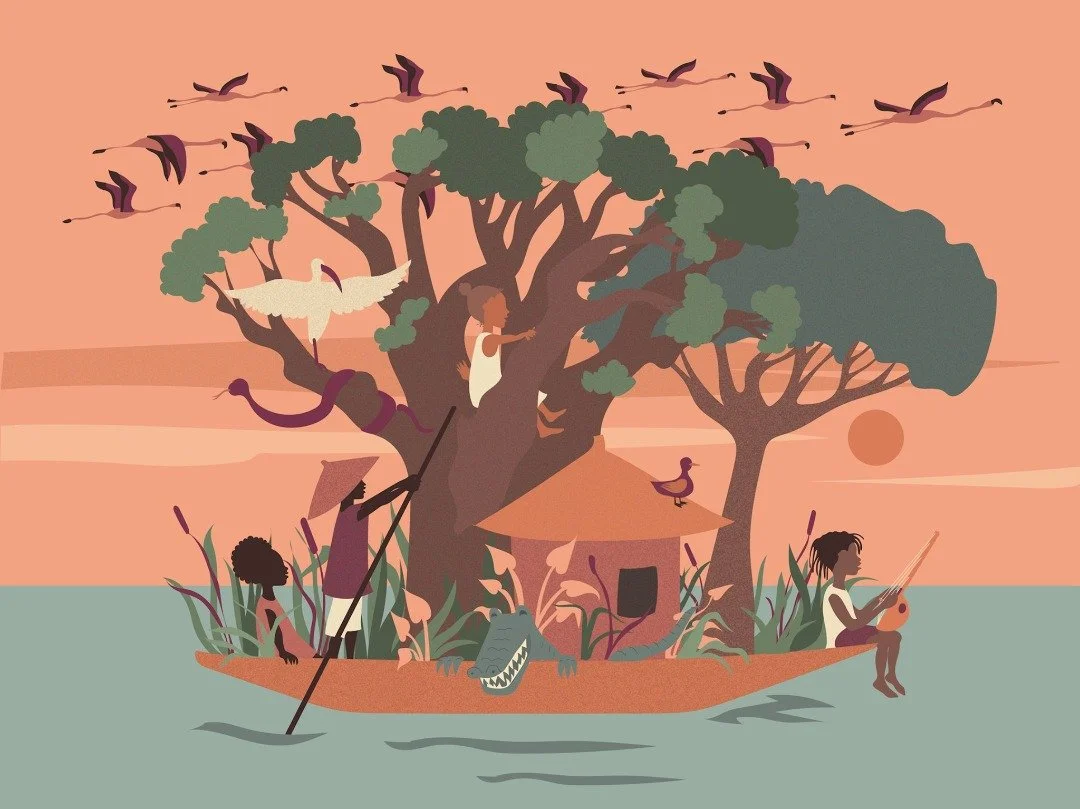Interviewee: Karima Grant
Interviewer: Giulia Gualtieri
March 2022
ImagiNation Afrika
KARIMA GRANT
I was born in the US to a Senegalese mother, but I returned to Senegal 20 years ago to work as a teacher. Once I settled in the country, I was shocked by the gap between what children learned at school and what they needed to know in the 21st century. This prompted me to start Senegal's first cultural and educational hub for children in 2016, called Ker ImagiNation. The programme is part of ImagiNation Afrika, the non-profit organization I founded and directed since 2011.
WHAT DO PLAYFUL LEARNING AND PLAYFUL CITIES MEAN FOR YOU AND IMAGINATION AFRIKA?
I think that playful learning is the idea of the best way for children to develop. The idea explains how development happens: learning happens for children in the most natural way possible, in ways that put children in the center so that they can direct their own learning. Children should be empowered to learn by using their hands, feet, and whole bodies to experience and learn how to become adults. Therefore, for me, playful learning defines how we support children's growth, from when they are in their mother's belly until they turn into competent human beings.
I understand playful cities as cities that hold children at the centre. These cities are committed to being a child's ally, nurturing their whole development. To have more playful cities, we need to think about the physical environment and the aesthetic nature of cities, considering the health factors, the social and emotional environment as well as all the actors that contribute to children, including caregivers. The term playful cities come from the Western world, and we in the Global South are trying to appropriate this term. While I am glad that we have the terminology to refer to such an important idea, to be honest, it has been a long time since such concepts have been shared and implemented in African contexts. For instance, you heard from my sister Amowi Phillips from Mmofra Foundation, Ghana, and the story of her mother, Efua Sunderland and her seminal work, Playtime in Africa. Already in the 80s, she was talking about the importance and diversity of play in public spaces.
“Children should be empowered to learn by using their hands, feet, and whole bodies to experience and learn how to become adults.”
WHICH CHALLENGES DO CHILDREN EXPERIENCE IN THE SENEGALESE CONTEXT?
The main challenges that children experience here in Senegal come from our (the adults) understanding of what a child needs and deserves. So, what is the idea of childhood? What should a childhood encompass? And what should it include? We haven't updated these concepts completely here, especially considering the complexity we face in our Senegalese cities. I think that a child deserves safety, nourishment, and play, regardless of issues or financial status. Besides, the number of children growing up on the street of Dakar is the normality of our visual landscape nowadays. Sadly, it is acceptable to have children on the street begging for money and consider the road the place they belong.
WHAT INSPIRED YOU TO START IMAGINATION AFRIKA?
I started ImagiNation Afrika when I first came to Senegal, almost 20 years ago, and I started working as a teacher. At that time, I was so amazed by all the cultural assets and possibilities surrounding young people. But yet the educational system, its structure and its symbols were not allowing children to express and develop their enormous potential and energies. And it was at that moment, during a book writing workshop, I had the chance to rethink the process that children use to learn. ImagiNation Afrika was born during this elaboration of a different vision of childhood and new outcomes for childhood learning through innovative approaches. Over the years, we've gotten to the point where we could think at the macro level of how children develop relationships with their surrounding spaces and, secondly, with cities.
WHO ARE THE OTHER CHAMPIONS WORKING IN YOUR FIELD IN SENEGAL?
I think there are many experts, in general, working with youth in different ways. For example, a brother of mine (I mean a brother in my heart) named Sobel Ngom. He has this fantastic project called the 'consortium Jeunesse' consisting of a space where young people can meet, gather and share. Here young people come together to learn skills.
Thinking broader to the whole continent, the African Play Network is a network of children’s play spaces and institutions dedicated to playing. These include the Playground Hub in Rwanda, headed by Julian Ingabire, the Mmofra Foundation headed by Amowi Phillips, and Play Africa, founded by Gretchen Wilson-Prangley in South Africa. I am glad to be part of this group of innovators questioning not only what the school system can do and what schooling should look like, but how we can transform our environments generally to support children. They are essential allies.
We want to thank Karima for her passion and activist dedication to promoting more inclusive and just cities and creating more child-friendly environments in Senegal.
Thank you for sharing YOUR STORY WITH THE HUASIPICHANGA COMMUNITY!





